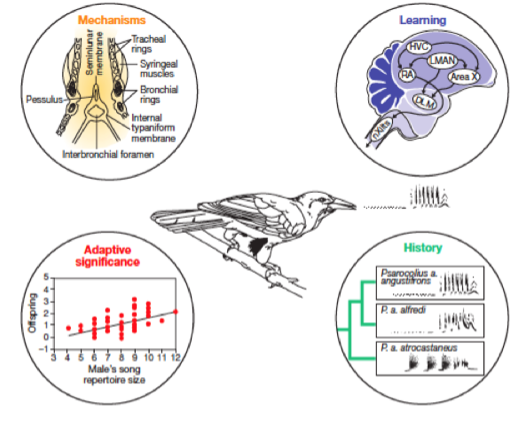
Prerequisites
This is an intermediate course intended for sophomores and juniors with interests in zoology, evolution and behavioral neuroscience. BIOL 001 and BIOL 002, or the equivalents, are required prerequisites.
Course Synopsis
This course provides an introduction to the experimental study of animal behavior. Animal behavior has been of central importance and interest to humans for our entire history as a species due to our role as hunters, foragers, and highly social creatures. Here we will take an integrative approach to the question of “why do animals behave the way that they do?” Topics will include: foraging, movement, social behavior, sex, communication, cooperation, and conflict. The central framework we will rely on, known as Tinbergen’s Four Questions, will allow students to build up a foundational understanding of where behavioral variation comes from by integrating causation (mechanism), development (ontogeny), function (fitness consequences) and phylogenetic pattern (evolutionary-historical constraints). An understanding of animal behavior can be an important asset for a career in a variety of fields, including academia, biological and health sciences, veterinary sciences, urban planning, conservation and wildlife management. But an understanding of animal behavior can also greatly enrich your experience in and familiarity with the natural world. Together with the lab component students will be benefit from a rigorous introduction to experimental and analytical approaches to the study of behavior.
Course Philosophy
As instructor it is my job to teach you how to think, not what to think. Specifically, how to think like a biologist, and über-specifically how to think like a behaviorist. That is, how to seek and approach truth by way of trained observation, hypothesis generation, complex and quantitative reasoning, critical thinking and scientific inference. If you gain this intellectual toolkit and you couple it to a motivation towards lifelong intellectual growth and curiosity, you will be on a path towards acquiring the single most powerful human invention—and you will be able to link aspects of your success in life to those efforts. If you fall short of these skills it is because either the instructor, student or instructor-student relationship (or a combination thereof) have failed at some level. We can predictably avoid most if not all of those undesirable cases by abiding by a kind of Course Covenant (see separate document).
Course Structure
1. Lecture sessions will be used for:
a. instructor-led lectures that compliment (not duplicate) textbook readings
b. active learning exercises
c. Journal Club discussions of primary literature on select topics
2. Lab sessions will involve:
a. practical lab and field work that introduces students to techniques in vertebrate behavioral biology
b. grant proposal workshops culminating in individual grant proposals.
This is an intermediate course intended for sophomores and juniors with interests in zoology, evolution and behavioral neuroscience. BIOL 001 and BIOL 002, or the equivalents, are required prerequisites.
Course Synopsis
This course provides an introduction to the experimental study of animal behavior. Animal behavior has been of central importance and interest to humans for our entire history as a species due to our role as hunters, foragers, and highly social creatures. Here we will take an integrative approach to the question of “why do animals behave the way that they do?” Topics will include: foraging, movement, social behavior, sex, communication, cooperation, and conflict. The central framework we will rely on, known as Tinbergen’s Four Questions, will allow students to build up a foundational understanding of where behavioral variation comes from by integrating causation (mechanism), development (ontogeny), function (fitness consequences) and phylogenetic pattern (evolutionary-historical constraints). An understanding of animal behavior can be an important asset for a career in a variety of fields, including academia, biological and health sciences, veterinary sciences, urban planning, conservation and wildlife management. But an understanding of animal behavior can also greatly enrich your experience in and familiarity with the natural world. Together with the lab component students will be benefit from a rigorous introduction to experimental and analytical approaches to the study of behavior.
Course Philosophy
As instructor it is my job to teach you how to think, not what to think. Specifically, how to think like a biologist, and über-specifically how to think like a behaviorist. That is, how to seek and approach truth by way of trained observation, hypothesis generation, complex and quantitative reasoning, critical thinking and scientific inference. If you gain this intellectual toolkit and you couple it to a motivation towards lifelong intellectual growth and curiosity, you will be on a path towards acquiring the single most powerful human invention—and you will be able to link aspects of your success in life to those efforts. If you fall short of these skills it is because either the instructor, student or instructor-student relationship (or a combination thereof) have failed at some level. We can predictably avoid most if not all of those undesirable cases by abiding by a kind of Course Covenant (see separate document).
Course Structure
1. Lecture sessions will be used for:
a. instructor-led lectures that compliment (not duplicate) textbook readings
b. active learning exercises
c. Journal Club discussions of primary literature on select topics
2. Lab sessions will involve:
a. practical lab and field work that introduces students to techniques in vertebrate behavioral biology
b. grant proposal workshops culminating in individual grant proposals.
- Teacher: Alexander Baugh
